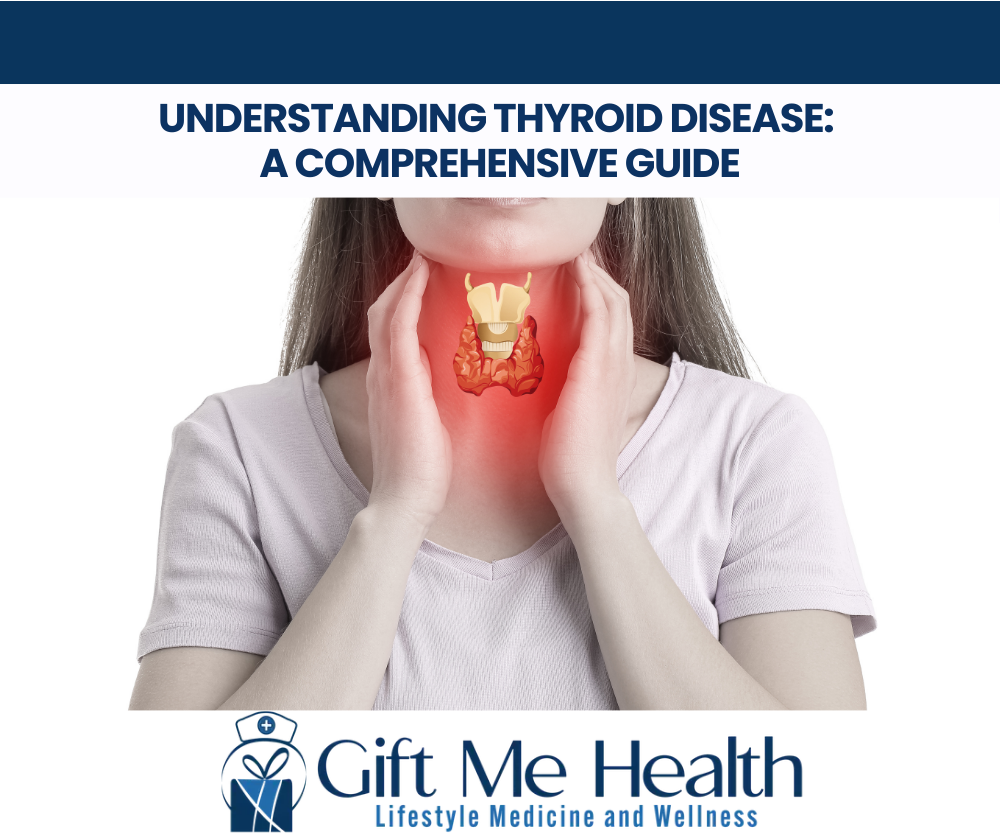 At Gift Me Health Lifestyle Medicine and Wellness, we are dedicated to empowering our clients with knowledge and resources to take charge of their health. One of the conditions we frequently encounter in our practice is thyroid disease. The thyroid, a small butterfly-shaped gland located in the neck, plays a crucial role in regulating the body’s metabolism, energy levels, and overall hormonal balance. In this blog post, we will explore the different types of thyroid disease, their symptoms, diagnosis, and treatment options. Additionally, we have included a comprehensive Q&A section to address common questions and concerns.
At Gift Me Health Lifestyle Medicine and Wellness, we are dedicated to empowering our clients with knowledge and resources to take charge of their health. One of the conditions we frequently encounter in our practice is thyroid disease. The thyroid, a small butterfly-shaped gland located in the neck, plays a crucial role in regulating the body’s metabolism, energy levels, and overall hormonal balance. In this blog post, we will explore the different types of thyroid disease, their symptoms, diagnosis, and treatment options. Additionally, we have included a comprehensive Q&A section to address common questions and concerns.
Types of Thyroid Disease
- Hypothyroidism: This condition occurs when the thyroid gland produces insufficient thyroid hormones. It can lead to symptoms such as fatigue, weight gain, cold intolerance, and depression. The most common cause of hypothyroidism is Hashimoto’s thyroiditis, an autoimmune disorder.
- Hyperthyroidism: In contrast to hypothyroidism, hyperthyroidism involves an overproduction of thyroid hormones. Symptoms include weight loss, heat intolerance, anxiety, and rapid heart rate. Graves’ disease, another autoimmune disorder, is a leading cause of hyperthyroidism.
- Goiter: An enlargement of the thyroid gland, which can occur with both hypothyroidism and hyperthyroidism. It can cause visible swelling in the neck and may lead to difficulty breathing or swallowing.
- Thyroid Nodules: These are lumps or growths within the thyroid gland. While most nodules are benign, some can be cancerous and require further evaluation.
- Thyroid Cancer: Although relatively rare, thyroid cancer is a serious condition that requires prompt medical attention. Symptoms may include a lump in the neck, difficulty swallowing, and changes in voice.
Symptoms of Thyroid Disease
- Hypothyroidism: Fatigue, weight gain, cold intolerance, dry skin, constipation, depression, and muscle weakness.
- Hyperthyroidism: Weight loss, heat intolerance, anxiety, tremors, palpitations, increased appetite, and sweating.
- Goiter: Visible swelling in the neck, difficulty breathing, and swallowing issues.
- Thyroid Nodules: Lump in the neck, hoarseness, and sometimes no symptoms at all.
- Thyroid Cancer: Lump in the neck, difficulty swallowing, persistent cough, and voice changes.
Diagnosis
Diagnosing thyroid disease typically involves a combination of physical exams, blood tests, imaging studies, and sometimes biopsy procedures. Key diagnostic tests include:
- Blood Tests: Measure levels of thyroid hormones (T3 and T4) and thyroid-stimulating hormone (TSH).
- Ultrasound: Used to evaluate thyroid nodules and enlargement.
- Radioactive Iodine Uptake Test: Assesses thyroid function and detects hyperthyroidism.
- Fine-Needle Aspiration Biopsy: Evaluates thyroid nodules for cancer.
Treatment Options
- Hypothyroidism: Treated with synthetic thyroid hormone replacement therapy, such as levothyroxine.
- Hyperthyroidism: Options include antithyroid medications, radioactive iodine therapy, and sometimes surgery.
- Goiter: Treatment depends on the underlying cause and may involve medication, radioactive iodine, or surgery.
- Thyroid Nodules: Benign nodules may require monitoring, while cancerous nodules necessitate surgery and possibly radioactive iodine therapy.
- Thyroid Cancer: Treatment typically involves surgery, radioactive iodine therapy, and sometimes external radiation therapy or chemotherapy.
Comprehensive Q&A Section
Q: What causes thyroid disease?
A: Thyroid disease can be caused by autoimmune disorders (like Hashimoto’s thyroiditis and Graves’ disease), iodine deficiency, genetic factors, radiation exposure, and certain medications.
Q: How common is thyroid disease?
A: Thyroid disease is quite common, affecting millions of people worldwide. Hypothyroidism is more prevalent than hyperthyroidism, and women are more likely to develop thyroid disorders than men.
Q: Can thyroid disease be prevented?
A: While some causes of thyroid disease, like autoimmune disorders and genetic factors, cannot be prevented, maintaining a balanced diet with adequate iodine intake and regular medical check-ups can help in early detection and management.
Q: What dietary changes can help manage thyroid disease?
A: For hypothyroidism, a diet rich in iodine, selenium, and zinc can be beneficial. For hyperthyroidism, avoiding excessive iodine intake and including foods that can potentially reduce thyroid activity, such as cruciferous vegetables, may help.
Q: Can stress affect my thyroid?
A: Yes, chronic stress can impact thyroid function. Managing stress through relaxation techniques, regular exercise, and a healthy lifestyle can support thyroid health.
Q: How often should I get my thyroid levels checked?
A: If you have a diagnosed thyroid condition, your doctor will recommend how often you need testing. Generally, those on thyroid medication need regular monitoring to ensure optimal hormone levels.
Q: Are there natural treatments for thyroid disease?
A: While lifestyle changes and dietary adjustments can support thyroid health, it is crucial to follow medical advice and treatments prescribed by your healthcare provider. Alternative treatments should be discussed with your doctor.
Q: Can thyroid disease affect pregnancy?
A: Yes, thyroid disease can impact pregnancy and fetal development. It is essential for women with thyroid conditions to work closely with their healthcare provider before and during pregnancy to ensure proper management.
Conclusion
Thyroid disease is a complex but manageable condition. At Gift Me Health Lifestyle Medicine and Wellness, we are committed to providing comprehensive care and support for individuals with thyroid disorders. If you have concerns about your thyroid health, please schedule a consultation with our expert team. Together, we can create a personalized plan to optimize your thyroid function and overall well-being.




